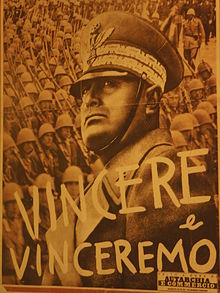
Back الفاشية والأيديولوجيا Arabic Filosofia nazista Portuguese Идеология фашизма Russian Ideologija fašizma Slovenian
| Part of a series on |
| Fascism |
|---|
 |

The history of fascist ideology is long and it draws on many sources. Fascists took inspiration from sources as ancient as the Spartans for their focus on racial purity and their emphasis on rule by an elite minority. Fascism has also been connected to the ideals of Plato, though there are key differences between the two. Fascism styled itself as the ideological successor to Rome, particularly the Roman Empire. From the same era, Georg Wilhelm Friedrich Hegel's view on the absolute authority of the state also strongly influenced fascist thinking. The French Revolution was a major influence insofar as the Nazis saw themselves as fighting back against many of the ideas which it brought to prominence, especially liberalism, liberal democracy and racial equality, whereas on the other hand, fascism drew heavily on the revolutionary ideal of nationalism. The prejudice of a "high and noble" Aryan culture as opposed to a "parasitic" Semitic culture was core to Nazi racial views, while other early forms of fascism concerned themselves with non-racialized conceptions of the nation.
Common themes among fascist movements include: authoritarianism, nationalism (including racial nationalism and religious nationalism), hierarchy and elitism, and militarism. Other aspects of fascism such as perception of decadence, anti-egalitarianism and totalitarianism can be seen to originate from these ideas. Roger Griffin has proposed that fascism is a synthesis of totalitarianism and ultranationalism sacralized through a myth of national rebirth and regeneration, which he terms "Palingenetic ultranationalism".
Fascism's relationship with other ideologies of its day has been complex. It frequently considered those ideologies its adversaries, but at the same time it was also focused on co-opting their more popular aspects. Fascism supported private property rights – except for the groups which it persecuted – and the profit motive of capitalism, but it sought to eliminate the autonomy of large-scale capitalism from the state. Fascists shared many of the goals of the conservatives of their day and they often allied themselves with them by drawing recruits from disaffected conservative ranks, but they presented themselves as holding a more modern ideology, with less focus on things like traditional religion, and sought to radically reshape society through revolutionary action rather than preserve the status quo. Fascism opposed class conflict and the egalitarian and international character of socialism. It strongly opposed liberalism, communism, anarchism, and democratic socialism.
© MMXXIII Rich X Search. We shall prevail. All rights reserved. Rich X Search